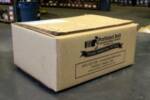Newest FAQs
Engineers often design anchor bolts in one of four common configurations. We see anchor bolts with forged heads, 90 degree bends, straight rods often with anchor plates on the bottom, and swedged rods. Engineers will design a structure using different grades and configurations based on the size, weight and design of a structure, wind forces,... Read more
Portland Bolt forms threads using two methods: cut threading and roll threading. Cut threading is a process that removes steel to form the threads. The roll threading method we utilize starts with reduced body pitch diameter steel. To make a one inch bolt we would use .912 inch round bar. This steel is forced between... Read more

Generally speaking, bolts over 1-1/2″ in diameter should be designed in 1/4″ increments, regardless of grade. While it is possible to manufacture bolts in 1/8″ increments (i.e. 2-3/8″), there are several reasons why you would want to avoid it. Steel Availability Steel round bar used to manufacture bolts is not readily available in 1/8″ increments over... Read more
The term “lock washer” can include a huge variety of different products used in many different applications that often are very specific and can include many different grades, materials and purposes. When our customers refer to a lock washer, we assume they are referencing a “split lock washer” that is a generic lock washer that... Read more

In order to answer this question, we must first define what conflict minerals are. Any natural resource that is mined in a conflict zone and sold to perpetuate fighting is defined as a conflict resource. The conflict minerals that are most commonly extracted are cassiterite (used for tin), wolframite (used for tungsten), coltan (used for... Read more
Portland Bolt is unaware of any information that addresses this question. Plastic sleeves seem to be a “gray area” due to the fact that no specifications cover them or design guides mention them. AISC Design Guide 1, 2nd Edition, Base Plate And Anchor Rod Design, Page 49, does address steel sleeves and has information on... Read more
The typical fix to this issue is to buy a larger sleeve for the next imperial (inch) diameter up and duct tape the sleeve to the rod to fix it in place. A less-frequently used alternative is to buy a smaller sleeve and cut the sleeve to fit the anchor bolt. According to our customers... Read more
Not really. Plastic anchor sleeves are mass produced in standard sizes and are not feasible to be custom made with custom diameters or lengths. The tooling/molds to create a custom size are expensive and have long lead times to such a degree that the manufacturers of the sleeves are unwilling to pursue custom tooling. If a... Read more
According to the Incoterms 2010 standard which is published by the International Chamber of Commerce, the acronym “FOB” stands for “free on board.” In the US, this acronym “FOB” is commonly used when shipping goods to acknowledge who is responsible for the costs associated with loading, transporting and/or the point at which the ownership of... Read more

No. Just like in the case of anchor bolts being specified as A325, supplying anchor bolts as ASTM A490 is technically something that should be avoided. This is because the A490 specification is intended to cover heavy hex head bolts for structural steel connections only. This is mentioned in several places within the A490 specification.... Read more
